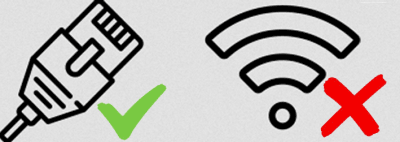I was setting up Macrium Reflect on a laptop. I was planning on doing my backups over WiFi. I use WiFi 6 so it's quick enough to do the backups. I elected to perform a verification after the backup.
I ran my backup, and it failed on the verification saying that a block hash failed. I repeated this several times and every single time it failed, but always at a different point in the verification.
I was sure that I had a Reflect problem. Wrong!
As I test, I simply copied about 50GB of files from the laptop to the Windows system that I was baking up to simply using File Explorer. Then I ran checksums on all the files. Sure enough, one file showed a different checksum. The files look absolutely identical, with the exact same size, but clearly, they are different.
So, this falls into the category of a "silent failure". If I were simply copying files using File Explorer, I would have never been the wiser. It would have looked like everything was fine.
So, this just shows how important it is to have good quality backups. The irony in this whole thing was that merely the act of setting up my backups for the first time showed me that I have a major problem.
Well, tomorrow (okay, later today) will be interesting as I figure out where the problem is and whether I have bad data elsewhere.
I ran my backup, and it failed on the verification saying that a block hash failed. I repeated this several times and every single time it failed, but always at a different point in the verification.
I was sure that I had a Reflect problem. Wrong!
As I test, I simply copied about 50GB of files from the laptop to the Windows system that I was baking up to simply using File Explorer. Then I ran checksums on all the files. Sure enough, one file showed a different checksum. The files look absolutely identical, with the exact same size, but clearly, they are different.
So, this falls into the category of a "silent failure". If I were simply copying files using File Explorer, I would have never been the wiser. It would have looked like everything was fine.
So, this just shows how important it is to have good quality backups. The irony in this whole thing was that merely the act of setting up my backups for the first time showed me that I have a major problem.
Well, tomorrow (okay, later today) will be interesting as I figure out where the problem is and whether I have bad data elsewhere.
My Computers
System One System Two
-
- OS
- Win11 Pro 24H2
- Computer type
- PC/Desktop
- Manufacturer/Model
- Self-built
- CPU
- Intel i7 11700K
- Motherboard
- ASUS Prime Z590-A MB
- Memory
- 64GB (Waiting for warranty replacement of another 64GB for 128GB total)
- Graphics Card(s)
- No GPU - Built-in Intel Graphics
- Sound Card
- Integrated
- Monitor(s) Displays
- HP Envy 32
- Screen Resolution
- 2560 x 1440
- Hard Drives
- 1 x 1TB NVMe SSD
1 x 2TB NVMe SSD
1 x 4TB NVMe SSD
3 x 512GB 2.5" SSD
1 x 4TB 2.5" SSD
5 x 8TB Seagate Barracuda HDD
- PSU
- Corsair HX850i
- Case
- Corsair iCUE RGB 5000X mid tower case
- Cooling
- Noctua NF-S12A chromax.black.swap case fans (Qty. 7) & Home Computer Specifications, Configuration, and Usage Notes General Specifications ASUS Prime Z590-A motherboard, serial number M1M0KC222467ARP Intel Core i7-11700K CPU (11th Gen Rocket Lake / LGA 1200 Socket) 128GB Crucial Ballistix RGB DDR4 3200 MHz DRAM (4 x 32GB) Corsair iCUE RGB 5000X mid tower case Noctua NH-D15 chromax.black CPU cooler Noctua NF-S12A chromax.black.swap case fans (Qty. 7) & Corsair LL-120 RGB Fans (Qty. 3)
- Keyboard
- Corsair K70 Max RGB Magnetic Keyboard
- Mouse
- Logitech MX Master 3
- Internet Speed
- 1Gb Up / 1 Gb Down
- Browser
- Edge
- Antivirus
- Windows Defender
- Other Info
- The five 8TB drives and three 512GB SSDs are part of a DrivePool using StableBit DrivePool software. The three SSDs are devoted purely to caching for the 8TB drives. All of the important data is stored in triplicate so that I can withstand simultaneous failure of 2 disks.
Networking: 2.5Gbps Ethernet and WiFi 6e
-
- Operating System
- Win11 Pro 23H2
- Computer type
- Laptop
- Manufacturer/Model
- Lenovo ThinkBook 13x Gen 2
- CPU
- Intel i7-1255U
- Memory
- 16 GB
- Graphics card(s)
- Intel Iris Xe Graphics
- Sound Card
- Realtek® ALC3306-CG codec
- Monitor(s) Displays
- 13.3-inch IPS Display
- Screen Resolution
- WQXGA (2560 x 1600)
- Hard Drives
- 2 TB 4 x 4 NVMe SSD
- PSU
- USB-C / Thunderbolt 4 Power / Charging
- Keyboard
- Backlit, spill resistant keyboard
- Mouse
- Buttonless Glass Precision Touchpad
- Internet Speed
- 1Gb Up / 1Gb Down
- Browser
- Edge
- Antivirus
- Windows Defender
- Other Info
- WiFi 6e / Bluetooth 5.1 / Facial Recognition / Fingerprint Sensor / ToF (Time of Flight) Human Presence Sensor








